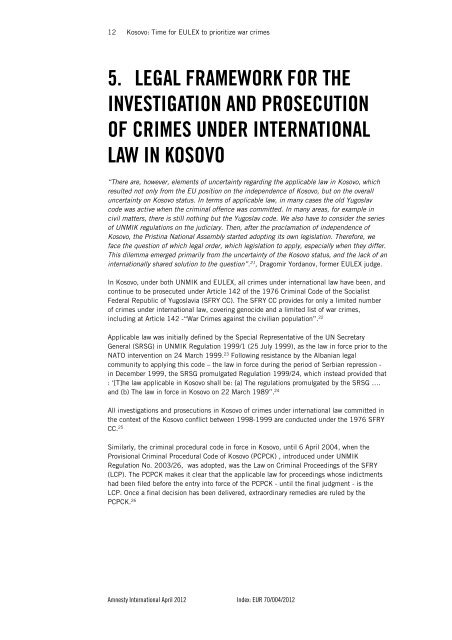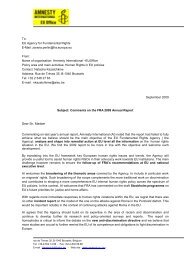Time for eULeX To prioriTize war crimes - Amnesty International ...
Time for eULeX To prioriTize war crimes - Amnesty International ...
Time for eULeX To prioriTize war crimes - Amnesty International ...
You also want an ePaper? Increase the reach of your titles
YUMPU automatically turns print PDFs into web optimized ePapers that Google loves.
12<br />
Kosovo: <strong>Time</strong> <strong>for</strong> EULEX to prioritize <strong>war</strong> <strong>crimes</strong><br />
5. LEGAL FRAMEWORK FOR THE<br />
INVESTIGATION AND PROSECUTION<br />
OF CRIMES UNDER INTERNATIONAL<br />
LAW IN KOSOVO<br />
“There are, however, elements of uncertainty regarding the applicable law in Kosovo, which<br />
resulted not only from the EU position on the independence of Kosovo, but on the overall<br />
uncertainty on Kosovo status. In terms of applicable law, in many cases the old Yugoslav<br />
code was active when the criminal offence was committed. In many areas, <strong>for</strong> example in<br />
civil matters, there is still nothing but the Yugoslav code. We also have to consider the series<br />
of UNMIK regulations on the judiciary. Then, after the proclamation of independence of<br />
Kosovo, the Pristina National Assembly started adopting its own legislation. There<strong>for</strong>e, we<br />
face the question of which legal order, which legislation to apply, especially when they differ.<br />
This dilemma emerged primarily from the uncertainty of the Kosovo status, and the lack of an<br />
internationally shared solution to the question”. 21 , Dragomir Yordanov, <strong>for</strong>mer EULEX judge.<br />
In Kosovo, under both UNMIK and EULEX, all <strong>crimes</strong> under international law have been, and<br />
continue to be prosecuted under Article 142 of the 1976 Criminal Code of the Socialist<br />
Federal Republic of Yugoslavia (SFRY CC). The SFRY CC provides <strong>for</strong> only a limited number<br />
of <strong>crimes</strong> under international law, covering genocide and a limited list of <strong>war</strong> <strong>crimes</strong>,<br />
including at Article 142 -“War Crimes against the civilian population”. 22<br />
Applicable law was initially defined by the Special Representative of the UN Secretary<br />
General (SRSG) in UNMIK Regulation 1999/1 (25 July 1999), as the law in <strong>for</strong>ce prior to the<br />
NATO intervention on 24 March 1999. 23 Following resistance by the Albanian legal<br />
community to applying this code – the law in <strong>for</strong>ce during the period of Serbian repression -<br />
in December 1999, the SRSG promulgated Regulation 1999/24, which instead provided that<br />
: ‘[T]he law applicable in Kosovo shall be: (a) The regulations promulgated by the SRSG ….<br />
and (b) The law in <strong>for</strong>ce in Kosovo on 22 March 1989”. 24<br />
All investigations and prosecutions in Kosovo of <strong>crimes</strong> under international law committed in<br />
the context of the Kosovo conflict between 1998-1999 are conducted under the 1976 SFRY<br />
CC. 25<br />
Similarly, the criminal procedural code in <strong>for</strong>ce in Kosovo, until 6 April 2004, when the<br />
Provisional Criminal Procedural Code of Kosovo (PCPCK) , introduced under UNMIK<br />
Regulation No. 2003/26, was adopted, was the Law on Criminal Proceedings of the SFRY<br />
(LCP). The PCPCK makes it clear that the applicable law <strong>for</strong> proceedings whose indictments<br />
had been filed be<strong>for</strong>e the entry into <strong>for</strong>ce of the PCPCK - until the final judgment - is the<br />
LCP. Once a final decision has been delivered, extraordinary remedies are ruled by the<br />
PCPCK. 26<br />
<strong>Amnesty</strong> <strong>International</strong> April 2012 Index: EUR 70/004/2012



